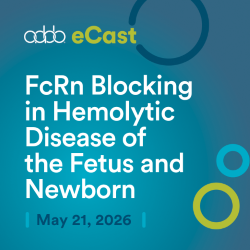

Product Code: 26EL-636-2035
Please note: This is a Single Viewer eCast registration for one participant for this eCast for both the live and on-demand version of this eCast. If you are interested in presenting this program to a group, please see the “eCast Registration Form– Group Viewing” form on the eCast program page.
Access instructions for the live eCast will be provided via email approximately 2-3 business days prior to the live program date. Access instructions for the on-demand version of this program will be provided via email approximately 3-10 business days after the live program has occurred and the on-demand version is available.
Program Description: Hemolytic disease of the fetus and newborn (HDFN) arises when maternal IgG alloantibodies cross the placenta and target fetal red blood cells (RBCs), leading to their destruction and/or suppression. While anti-D alloantibodies are the most common cause—and can be prevented with anti-D immunoglobulin prophylaxis—HDFN can also result from other alloantibodies, such as those directed against the Kell blood group system, for which no approved prophylactic therapies currently exist. An emerging therapeutic approach for HDFN involves targeting the neonatal Fc Receptor (FcRn), a key regulator of IgG homeostasis and transplacental IgG transfer. FcRn protects IgG from lysosomal degradation and mediates its transport across epithelial barriers, including the placenta. Inhibiting FcRn accelerates IgG degradation and may reduce maternal IgG antibody from reaching the fetus, thereby attenuating HDFN severity. This program will review FcRn biology, the current clinical landscape of FcRn-targeted therapies in HDFN, and potential applications of FcRn inhibition in other antibody-mediated hematologic disorders.